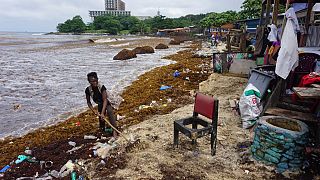Tanzania
Immersed in the sapphire water of the Indian ocean, are seaweeds. This ocean is the life blood of the Zanzibar community.
Seaweed, a key export in the semi-autonomous island is under threat. In recent years a lot of the seaweed has been dying. Experts suspect that this is the result of climate change.
Narriman Jiddawi, a marine biologist says, “The good temperature could be around 27 degrees-29 degrees, the seaweed can survive. But when it’s too hot it is making the seaweed not to grow very well. So a lot of women have stopped actually cultivating seaweed.”
Despite maintaining its position as the third largest seaweed exporter in the world, many farmers in Zanzibar have abandoned this line of work as they now feel the economic impact.
On Zanzibar local women are going against gender norms and unleashing the commercial potential of seaweed https://t.co/b0VDl0vvzH
— UN-Water (@UN_Water) April 12, 2016
“I started working in this field twenty years ago because I wanted to increase my income to support my family. But right now I am discouraged because the buying price has fallen, hopefully that will change,” said Mtumwa Vuai Ameir, a seaweed farmer.
During its peak, seaweed farming contributed about 8 million US dollars a year to the economy. The farmers greatly benefited from these contributions.
“We have to reduce the price. Last year we were buying from the farmers, the price was 600 shillings per kilo, and now the price has come down to 400 shillings… In Tanzania we have to be competitive, other wise they will not buy our seaweed,” explained Arif Issa Mazrui, the Director General of Zanque Aqua Farms
The autonomous islands’ newly elected president has promised to address the problem, including improving equipment used by farmers.
Seaweed is used as a source of food, for industrial applications and as a fertilizer.











01:09
Tanzania: Opposition leader Freeman Mbowe released on bail after arrest
11:05
New era of sovereignty in Mali's gold sector [Business Africa]
01:26
Zimbabwe’s Climate-Smart Agriculture: Empowering Farmers through Resilience and Innovation
01:59
Botswana’s young farmers hope new government will boost agriculture sector
11:07
Egypt's Economy Hard Hit by Gaza War [Business Africa]
Go to video
Zimbabwe to compensate white farmers 20 years after land seizures